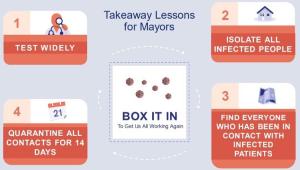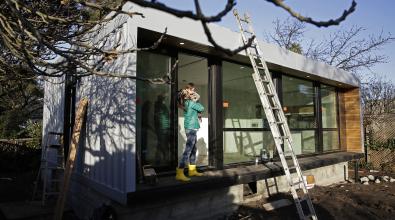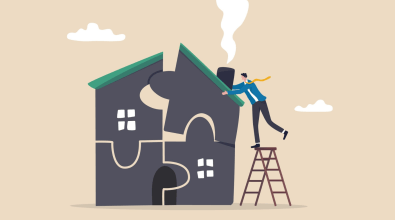How some cities are using hotels to help ‘box-in’ the virus

Quarantine and isolation of all exposed and infected people are critical steps to stop the spread of COVID-19. So critical, in fact, that they make up two of the four steps Dr. Tom Frieden has told mayors are necessary to “box-in” the virus.
And while communities have made substantial progress when it comes to testing and are beginning to build their contact-tracing capacity, they’ve found that many residents — especially those who live in small or crowded homes — could use help when it comes to isolating themselves if they become infected.
That’s why some cities have started to turn empty hotels into isolation centers for people who have COVID-19 but don’t require hospitalization.
New York City has 20,000 hotel rooms set up for this purpose. Austin, Texas, has leased a couple of hotels to use as isolation facilities. And this week, San Francisco Mayor London Breed announced that unused hotel rooms the city had initially leased for essential health care and public safety workers now are available for residents with COVID-19 to isolate away from their families.
While many cities have been leasing hotels for frontline workers, or to bring homeless residents in off the streets, some argue the approach hasn’t been used enough for other populations who simply need a safe place to isolate. Studies show that virus transmission within households is a major factor in the spread of COVID-19.
As the Wall Street Journal reported this week, isolating sick patients in exhibition centers, dormitories, and other centers has been a key part of successful containment strategies in China, Singapore, South Korea, and other Asian countries.
While most Americans would bristle at compulsory isolation, voluntary measures in hotels along the lines of what some U.S. cities are doing are a worthwhile expense, says Harvey Fineberg, chair of the standing committee on emerging infectious diseases at the National Academies of Sciences, Engineering, and Medicine. “This incremental expense would actually be a rounding error in the overall cost of the pandemic,” Dr. Fineberg told the Journal. “If all it did was to shorten the course of the pandemic by six weeks because it accelerates the deceleration, that would repay itself many times over.”
But turning a hotel into an isolation site requires much more than booking a bunch of rooms. Cities need to set up everything from the cleaning to the staffing. And while these aren’t hospitals, these facilities do require strong medical protocols and oversight in case residents develop severe symptoms. Last month, three recovering COVID-19 patients died in the same New York hotel after being discharged there from hospitals.
Current guidelines from the U.S. Centers for Disease Control and Prevention call for people who are sick with mild cases of COVID-19 — or think they might be — to recover at home. The guidelines call on those patients to stay in a specific room, away from other people and pets, and to use a separate bathroom. When household space is limited, the CDC says the sick person should stay six feet away from others, among other precautions.
But that’s not always possible, said Tom Ambrosino, the city manager of Chelsea, Mass., which is one of the hardest-hit cities in the state.
Many of Chelsea’s 40,000 residents live in crowded conditions, Ambrosino said, including some situations where multiple families live in one apartment. That’s why Chelsea partnered with the neighboring city of Revere, to lease a Quality Inn hotel with almost 150 rooms to provide residents a place to recover without fear of infecting other members of their household.
Residents isolating at the hotel get three meals a day, plus on-site medical and behavioral health care provided by Massachusetts General Hospital. “It’s a well-run facility,” Ambrosino said, offering three factors other city leaders should consider if thinking about following Chelsea’s lead.
1. Convincing people to isolate can be tricky. As of May 12, the hotel was only about half full, with 78 guests staying there — 39 of them from Chelsea. “The natural inclination of people is to stay in the place where they’re comfortable, which tends to be their apartment, so we’ve been fighting against that,” Ambrosino said. “Second, this is a heavily immigrant community. There are a lot of undocumented residents, and there’s concern anytime the government is operating anything that this is a precursor to deportation. So there’s that fear factor we have to deal with.”
2. Room service isn’t what you might expect. The cities have had to handle many of the logistics themselves. “If you find a hotel owner willing to cooperate with you, they’re basically going to hand you the keys and tell you good luck,” Ambrosino said. “None of these operators are going to have any available staff for you. So staffing the place, from the front desk to linen service to garbage service to food service and everything and anything a hotel typically provides, the municipality is responsible for doing it.”
3. It will be expensive. Ambrosino estimates Chelsea and Revere have spent close to $1.2 million to run the hotel for 60 days, a tab they expect the federal government to reimburse. While Ambrosino does not expect the cities to continue the operation beyond the first week of June, he said it’s been a good tool to have available in the crisis. “If you’re an older urban city with lots of crowded housing, you’re going to face this problem,” he said. “This is an effective way to mitigate the spread of the virus, but it’s a very expensive proposition.”



